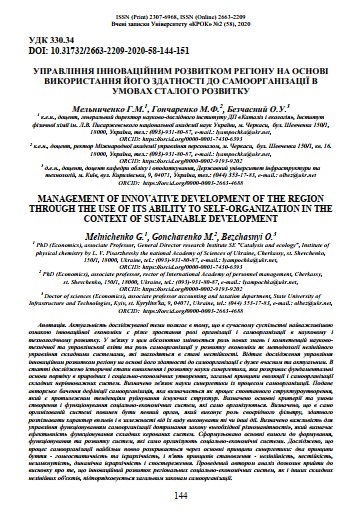MANAGEMENT OF INNOVATIVE DEVELOPMENT OF THE REGION THROUGH THE USE OF ITS ABILITY TO SELF-ORGANIZATION IN THE CONTEXT OF SUSTAINABLE DEVELOPMENT
DOI:
https://doi.org/10.31732/2663-2209-2020-58-144-151Keywords:
innovations, innovative development, self-organization, synergetic, sustainable development, regionAbstract
The relevance of the research topic is that in modern society the most important feature of the innovative economy is a sharp increase in the role of organization and self-organization in scientific and technological development. In this regard, the role of new knowledge and competencies of scientific, technical and managerial elite and the role of self-organization in economic development as a methodology of nonlinear management of complex systems that are in a state of instability. Therefore, the study of the management of innovative development of the region on the basis of its ability to self-organization is very timely and relevant. The article examines the historical stages of the emergence and development of the science of synergetic, which reveals the fundamental foundations of order in natural and socio-economic formations, the general principles of evolution and self-organization of complex no equilibrium systems. The connection of the science of synergetic with the process of self - organization is determined. The author's vision of the definition of self-organization is given, which is defined as a process of spontaneous structure formation, which is the opposite of the tendencies of destruction of existing structures. The main criteria and conditions for the creation and functioning of socio-economic systems, which are self-organized. It is determined that in the self-organized system there should be a certain body that performs the role of a kind of filter that can recognize the nature of influences and, depending on their type, perform certain actions. The importance for the management of the functioning of self-organization of compliance with the law of "necessary diversity", which determines the effectiveness of complex managed systems. The basic requirements for the formation, functioning and development of systems that self-organize socio-economic systems are formulated. It is studied that the process of self-organization is most fully revealed through the basic principles of synergetic: two principles of existence - homeostatic and hierarchical, and five principles of formation - nonlinearity, instability, openness, dynamic hierarchy and observation. The analysis conducted by the author allowed us to conclude that the innovative development of regional socio-economic systems, as well as other complex nonlinear objects, is subject to the general laws of self-organization.
Downloads


